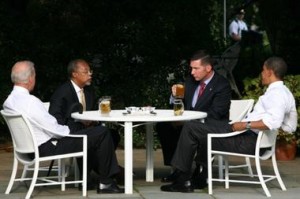I find it amusing that so many people found so many things to criticize about the recent “beer summit.” I loved it. A refreshing response to a volatile situation. The media whined, “If this is such a teachable moment, why won’t they let us be there to record what they are saying?” They didn’t get it. The teachable moment was not about what the participants said to each other over beer. The teachable moment came when four people, each embroiled in a conflict, sat down in a relaxed setting to talk. What a novel idea.
 Such an approach seems far too civil to be taken seriously. Most of what passes for political and social discourse these days takes a far different course. On TV, on the floors of congress, and on the radio talk shows, we typically get opinionated “experts” who are given microphones and then encouraged to go after each other. Each assumes that the other is uninformed, morally inferior, or simply morons. The advantage goes not to the one with the best argument or the most accurate information, but to the one who can talk louder, faster, and can more effectively talk over everyone else, including the moderator. Lots of smoke, very little fire. Each works to redefine and simplify the issue so that one opinion becomes truth and every other opinion is simply wrong. It’s OK to attack the personal arguments, but if that’s not enough, it’s standard practice to attack personal character as well. It’s a verbal prizefight where points are given for the most low blows landed.
Such an approach seems far too civil to be taken seriously. Most of what passes for political and social discourse these days takes a far different course. On TV, on the floors of congress, and on the radio talk shows, we typically get opinionated “experts” who are given microphones and then encouraged to go after each other. Each assumes that the other is uninformed, morally inferior, or simply morons. The advantage goes not to the one with the best argument or the most accurate information, but to the one who can talk louder, faster, and can more effectively talk over everyone else, including the moderator. Lots of smoke, very little fire. Each works to redefine and simplify the issue so that one opinion becomes truth and every other opinion is simply wrong. It’s OK to attack the personal arguments, but if that’s not enough, it’s standard practice to attack personal character as well. It’s a verbal prizefight where points are given for the most low blows landed.
Is anything accomplished with such an approach? We, the listeners, almost always end up holding onto the opinion we had in the beginning and disagreeing even more stridently with the opposing view. Our opinions about the issues don’t change. In fact, we are likely to hold onto our original positions even more tightly. We see and hear precisely what we expect to see and hear. Nothing new happens, ever.
Unlike such “debates,” dialogue is collaborative. Whether it’s over beer in the White House rose garden, over coffee in the diner, or over lunch with a colleague, the object of a dialogue is not to “win” but to more fully understand one another, both the differences and the commonalities. Imagine groups of African Americans and Anglos, Christians and Muslims, straights and gays, or any other group that has a history of misunderstanding, sitting down for a dialogue. What if we gave ourselves time to really listen, to allow both sides to expand on the issues, to recognize that things are not as simple and clear-cut as we’d like to believe. Wouldn’t it be interesting if each person in such a dialogue realized that he or she did not possess some ultimate truth, but that personal truths have been shaped, bent, and limited by personal experiences. Maybe we would have a little more space for learning about the other’s perspective with the same openness we would want from them.
What a thought: opposing sides gaining respect for each other rather than trying to score a knockout. Dialogue does not assume we will all agree, but out of dialogue can come creative options we could never think of if we were busy yelling and not listening.
I don’t know what transpired as Crowley, Gates, Obama, and Biden sat sipping and snacking. The fact that they sat down together, they talked, they shared food and drink, and then they went their separate ways peacefully is enough. Each reported a greater appreciation for the part each of them played in the racial drama. That speaks volumes, far more than a transcript of their conversation. And so, Mr. President, for understanding that dialogue can be a tool for change, and for demonstrating that understanding can sometimes accomplish what coercion can’t, this Bud’s for you.
Printed in the Abilene Reporter News, Sunday, August 9, 2009
0 Comments until now
Add your Comment!